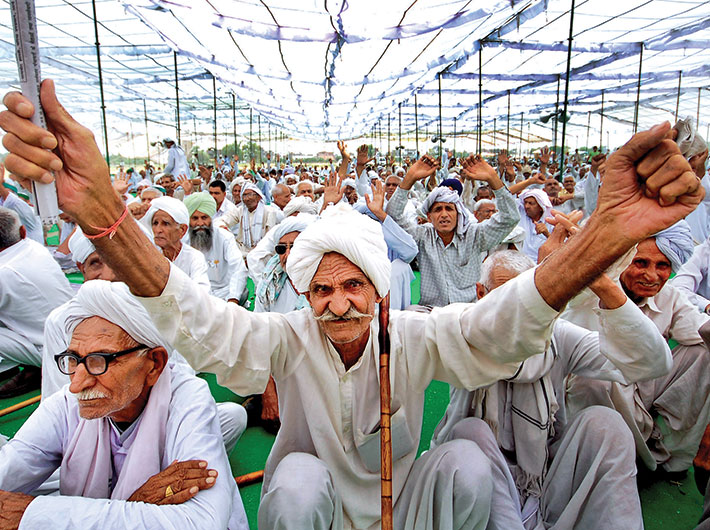Banning khap panchayats is an ill-conceived and undemocratic solution that can backfire
Over the last few years, thanks to some of the popular movements, Indian citizens seem to have become more aware of their basic rights: gender issues, for example, are being discussed in this election like never before. For this reason campaigning for the 2014 Lok Sabha elections is not as easy for the parties as it was earlier.
It wasn’t terribly surprising that Yogendra Yadav, a progressive man who is also AAP’s Lok Sabha candidate from Gurgaon, didn’t support a ban on khap panchayats. Yet it made news. Coming from a political party, it was written off by the media as well as academia as a vote-bank agenda. The fact is, Yogendra Yadav took quite a sensible stand.
Khap panchayats have been talked about in various spheres – media, politics, academia, law, and others. The media has generally done a good job of reporting the crimes against young men and women in the name of honour: due to the reach of newspapers and news channels in several parts of the country, news reports which were earlier considered to be exclusively for the local public have started making national headlines. At the same time, perhaps owing to the ephemeral nature of these reports, a deeper understanding of the issue has never been attempted.
Due to the lack of a proper understanding, many well-meaning people have demanded a ban on khap panchayats. What is missed here is the nature and history of the Indian state: the state and age-old institutions like khaps have to be juxtaposed in order to make sense of the phenomenon. This will help avoide the formulation and acceptance of superficial solutions like banning khap panchayats.
In 2010, the government asked the law commission to look into the matter of honour killings. The commission, in its report No 242 titled ‘Prevention of Interference with the Freedom of Matrimonial Alliances (In the name of honour and tradition): A suggested legal framework’, proposed that such honour crimes can be checked by prohibiting the gathering of panchayat members for the purpose of condemning the marriage and taking further action for harming and harassing. This suggestion becomes problematic in mediating justice. First of all, there has to be an understanding that khap is not just a panchayat or a gathering of members, but an area comprising several villages inhabited mainly by Jat communities. A political unit was organised for the purpose of social control of several villages, which came to be known as khap.
Jat communities’ social and juridical arrangement is based on institutional set-ups comprising blood relations like kutumb (family), thok, gotra, which is known as Khap Panchayat; above it is sarva (or all) khap panchayat, which is convened when the matter needs to be discussed with the heads of all khaps of various gotras.
Given this structural set-up, the biggest challenge in banning the khaps and their panchayats will be to locate on what level the ban has to be carried out for effective implementation. Secondly, even if some success is achieved in banning a gathering, the question is: what can be done about the shared mind and imagined cultural ethos of a community, which carries out crimes in the name of honour?
If a particular community considers certain behaviour against its honour or important for its survival, it will take action that it deems fit – either under psychological pressure or under the pressure of normative cultural values. Therefore, one needs to understand that simply banning khap panchayats is never the way out.
Considering the nature of the Indian state, it is highly undemocratic to demand or instruct anything in the vein of ban on khap panchayats. People within khap areas who do not support crimes of ‘honour’ also acknowledge the ability of khap’s head and its contribution in mitigating and controlling the rivalries. People believe they are efficient in dealing with the issues and disputes of their region and have less faith in the legal system and police, which appear alien and detached to them. The cases of rivalries, for example, in the villages of Kinauni and Barwala in Muzaffarnagar district of western Uttar Pradesh are well known in the region. Many families in these villages are left with females, as the male members are killed in bloodshed going on for generations.
Therefore, looking at the faith of the locals in the historically-established juridical system, banning of khaps and their panchayats would be futile. Secondly, it will be against the spirit of a democratic state, which gives all cultural communities the right to preserve their culture. The banning of khap panchayats is more of a propitiatory gesture, more escapist and less genuine in terms of finding a solution.
Of course, one cannot lose sight of issues concerning human rights, individual rights and gender. The point is: in order to preserve individual rights in the face of collective rights, the state cannot simply go ahead and make collective rights redundant; rather, it needs to make visible arrangements, which have strong deterrent effect on the crimes in the name of honour. It is high time genuine checks and balances, apropos to the situation, are figured out and implemented.
One of the steps could be a provision of robust arrangements for the protection of young men and women in case they report threat to their lives from community or family – something which is currently very lousily handled. Another necessary step has to be the new enactment for protection against crimes of honour similar to that of IPC Section 304-B read with Sections 113 and 114 of Evidence Act for dowry death cases. Harsh, futile and ill-conceived solutions like the banning of khap panchayats might backfire and worsen the condition of the female inhabitants of those areas.



